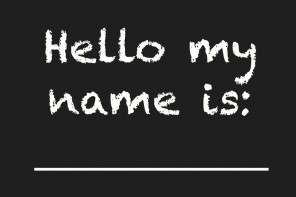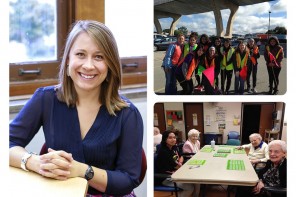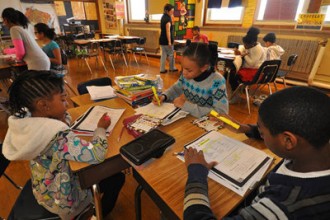By Talonda Lipsey-Brown —
Dear Miss,
You won’t remember me or my name. You have flunked so many of us. On the other hand, I have often had thoughts about you and the other teachers, and about that institution which you call “school” and about the kids that you flunk. You flunk us right out into the fields and factories and there you forget us.
This excerpt is from a book I read several years ago written by Marvin Hoffman entitled You Won’t Remember Me: The Schoolboys of Barbiana speak to Today. The book , based on a letter written by the sons of Tuscan peasants, was a vivid reminder to me of the powerful impact we as teachers have on the lives and futures of our students.
As I read this book and learned of the injustices inflicted upon these young, innocent minds, I began to reflect on my own schooling experiences and the encounters that I’ve had with my teachers. One particular teacher had an enduring effect on my life and I often think about her today…
Having no other comparison against my education, I believe that most of my teachers were great, taught effectively, and that I learned a lot—however, my 9th grade Civics teacher, Ms. P. was a different case. Ms. P’s class was a ninth grade citizenship course of approximately 25-30 students of mixed academic ability and Ms. P had been in the school system for a considerable amount of time. In a course in which we as students should have been learning of our rights as citizens of the United States, as well as the laws governing our system, we were given book work daily, allowed to socialize with friends, chitchat about non-educationally related subject matters, and never taught the content within the Wisconsin Model Academic Standards.
This is how I recall my ninth grade citizenship class, taught by Ms. P. As a student in this chaotic class of non-learning, day after day, I squandered my time away gossiping with friends, making weekend plans, talking about TV shows, music, movies, what happened during lunchtime, fashion, etc.; I did not realize that in the same class that we were supposed to be learning about our rights as U.S. Citizens, we were being robbed of our natural rights as students to have a decent education.
As a fourteen year old, I didn’t realize immediately that I wasn’t learning anything in this class, after all, I thought I was having fun–I came to class each day, was given book work to do, searched for the answers in the text while socializing without actually reading the text, and handed in the work. What was the outcome of all of my socializing and bookwork– an “A” both semesters in Ms. P’s class. What was the true outcome of all of my socializing and bookwork– not learning anything in this class and today, a feeling that I still lack information when it comes to my knowledge of the law.
One day, after many months in Ms. P’s class, it finally occurred to me that we hadn’t learned anything all year (before this, I don’t think I’d given it much thought—I produced the work, I got an “A”). Upon this epiphany that our teacher had essentially been a highly paid babysitter to a class of 25-30 ninth graders, I raised my hand and said, “Ms. P, why is it that you’ve never gotten up to teach the class? Why is it that we’ve learned nothing this year?”
Ms. P’s response, “I don’t teach ninth graders. I never teach ninth graders. You all are incapable of learning!” Accordingly, my classmates and I were literally dumbfounded, outraged and ashamed. Outraged because our TEACHER, the person our parents entrusted to help educate us, believed we were incapable of learning. We were ashamed, because it was nearly the end of the school year, and it took us all year to realize that we had been treated unfairly and stripped of our educational learning opportunity.
Several days later, Ms. P brought in a bucket of vanilla ice cream for the students as a “treat.” Needless to say, I didn’t eat the ice cream. I felt insulted that this teacher who told me and my classmates to our faces that we were incapable of learning, now tried to shut us up and bribe us with ice cream. It was in this moment that I was awakened to the fact that it was my personal responsibility to make sure that I learned as much as possible during each and every given learning opportunity. I knew that we had been wronged and discriminated against, yet, I felt powerless and partially responsible for this situation.
Because I was a self-starter, relatively smart and never needed much help with my schoolwork, my parent’s never questioned what I was learning in this particular class. Even after recognizing this injustice, I still did not go to my parents to inform them of it because I knew that it would mean serious repercussions for Ms. P. I cared about Ms. P. and her job status, even though it appeared that she could care less about the future of her students. Of course, I now realize that by allowing Ms. P to stay in this teaching position, I allowed her to continue the cycle and go through the system while doing hundreds of other students a disservice.
The next year, Ms. P didn’t return to our school. One positive thing that resulted from this experience, is that from that point on, I challenged my teachers when I felt the work was “watered-down” or below my potential for learning. This incident impelled my journey towards becoming critically conscious with regard to matters of race, class, gender and equity. As a teacher, I began each school year by sharing this story about my ninth grade citizenship class with my students in an effort to challenge them to become critically conscious with regard to their learning opportunities.
I don’t know if Ms. P. remembers me or that ninth grade class from so long ago however, fellow teachers, I share this reflection as a means of reminding us that our students do remember. Although over the course of our teaching career we will have the opportunity to touch the lives of hundreds of students, and we may not remember each and every one of their names as time goes on, our students will undoubtedly remember us.
I’ll end by asking the question…how will your students remember you?
_____________________________________________________
 Talonda Lipsey-Brown, Ph.D. is an Assistant Professor at Edgewood College and a part-time Instructor at Milwaukee Area Technical College. She was educated in the Milwaukee Public School System, where she also served as a teacher. She earned her Bachelor of Science Degree in Biological Sciences from Marquette University, her Master of Science Degree in Curriculum and Instruction, and her doctorate in Urban Education at the University of Wisconsin-Milwaukee. Dr. Lipsey-Brown’s research explores teachers’ identities, ideologies, and the impact of school climate on teachers’ relationships with students of color in urban and suburban schools.
Talonda Lipsey-Brown, Ph.D. is an Assistant Professor at Edgewood College and a part-time Instructor at Milwaukee Area Technical College. She was educated in the Milwaukee Public School System, where she also served as a teacher. She earned her Bachelor of Science Degree in Biological Sciences from Marquette University, her Master of Science Degree in Curriculum and Instruction, and her doctorate in Urban Education at the University of Wisconsin-Milwaukee. Dr. Lipsey-Brown’s research explores teachers’ identities, ideologies, and the impact of school climate on teachers’ relationships with students of color in urban and suburban schools.



 i evaluate to yes even if there's no image
i evaluate to yes even if there's no image  i evaluate to yes even if there's no image
i evaluate to yes even if there's no image  i evaluate to yes even if there's no image
i evaluate to yes even if there's no image 